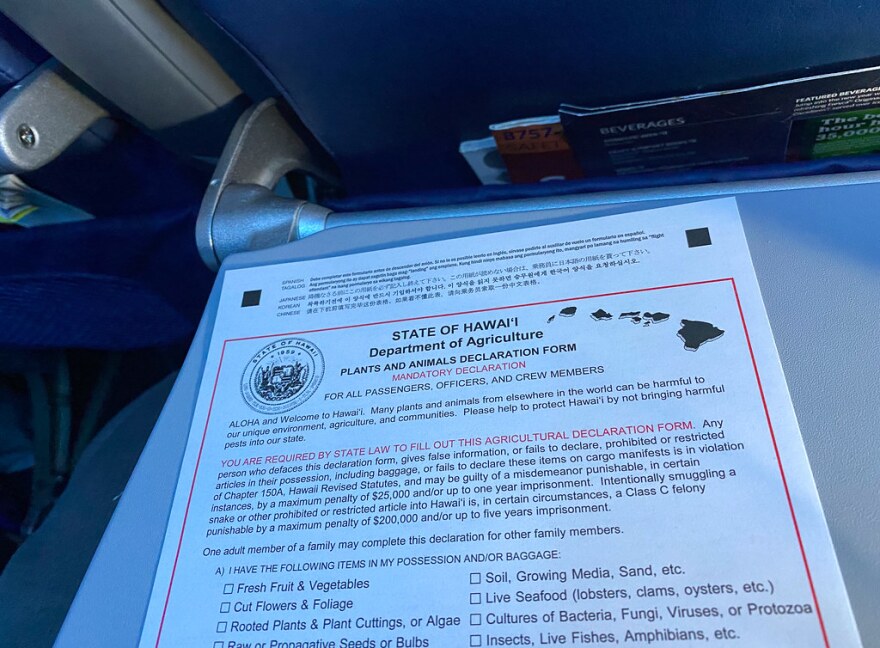Agricultural declaration forms for passengers flying to Hawaiʻi are on their way to becoming fully electronic. The state Department of Agriculture has been using paper forms since 1950.
Travelers have to fill out the form to note plants and animals they bring to the islands. The forms are meant to protect the state from invasive species and unwanted pests.
Right now, the paper forms are handed out to passengers to be filled out and collected while on the plane.
The state Legislature passed Senate Bill 2079 this session to allow the process to become completely electronic. Forms would be sent to travelers before they even board.
Senate Majority Floor Leader Sen. Glenn Wakai, who introduced the measure, said the paper forms don’t really protect the state from invasive species.
“It provides us a false sense of security regarding invasive species coming to the islands. In my opinion, the best time to educate a traveler about what not to bring to Hawaiʻi is before they get on the plane, not when they're on the plane,” he said.
“To have an amnesty bin when they arrive to throw in their contraband, I thought, was a backwards approach to trying to fight invasive species coming to the islands," Wakai added.
The prevalence of smartphones likely guarantees that there would be a higher compliance rate with digital forms than paper ones.
A 2023 study by the Department of Business, Economic Development and Tourism found “significant” enthusiasm behind digitizing the forms.
The DBEDT study found that the state pays just over $600,000 annually to print, distribute and process the paper forms. Going digital could save the state about $140,000 annually, although that depends on how the digital forms are realized.
The study said the estimated startup cost for an electronic system ranges from $525,000 to $2.4 million. The estimated recurring annual cost could range from $475,000 to $3.8 million.

Wakai envisioned the digital forms as a cost-saving measure and said that extra money could go toward more biosecurity enforcement.
The agriculture department supported the measure but said prior efforts would have removed paper forms altogether, which the department had opposed. Wakai noted that the department didn't need a measure to implement paper forms.
Jonathan Ho, acting manager of the department’s Plant Quarantine Branch, said a significant part of the problem, regardless of the form's format form, is enforcement.
He said there should be more dogs to sniff out potential contraband at airports.
“I think that's the challenge we have right now is getting to that point. It’s very hard for the inspector to go, ‘You have an apple, I want to check your bag.’ How do we know that? You can't just stop somebody and search their bags,” he said.
“That's where the frustration, I think, is for a lot of people — in the fact it feels useless because it doesn't feel like anybody's doing anything," Ho said.
Ho said the department follows up on about one declaration form per day for potentially harmful plants or animals. But he said there's no way to know how many are truly being brought to Hawaiʻi.





